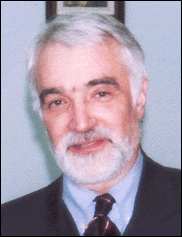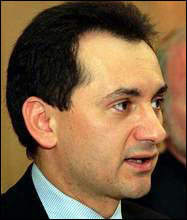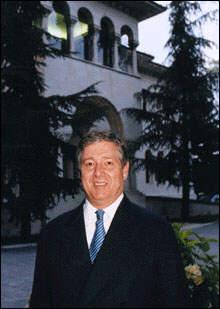 INTRODUCTION INTRODUCTION |
For the first time in recent history, Serbia has a strong democratic and reform oriented government. Eighteen parties and one labor union gathered as DOS, the Democratic Opposition of Serbia, won the parliamentary and presidential elections in late 2000. At this stage DOS holds all key positions in federal and Serbian government. The Federal Republic of Yugoslavia (FRY) is comprised of two republics - Serbia and Montenegro, both of which in March 2002 chose to keep separated economic systems but to join their efforts toward a fast association with the European Union (EU).
On October 5th 2000, former president of FRY, Slobodan Milosevic, was ousted. After ten years of Milosevic's rule, Serbian people chose to elect DOS because it promised fast and thorough economical reforms, rule of law and close cooperation with the international community.

Led by FRY president Vojislav Kostunica, Federal Deputy Prime Minister Miroljub Labus, member of the strongest Serbian non-governmental group G17 and Serbian prime minister Zoran Djindjic, leader of the Democratic Party (DS), the country made considerable achievements both on local and international levels. Within a year Serbia restored its relations with G7 group of countries, strengthened its already close ties with Russia and China, substantially improved its relations with neighboring countries and reached an agreement with its federal partner Republic of Montenegro about future relations.
Serbian diplomatic success was followed by the restoration of cooperation with all leading international financial organizations such as the International Monetary Fund (IMF), World Bank, World Trade Organization (WTO), European Bank for Reconstruction and Development (EBRD), European Investment Bank (EIB), and many others.
In 2001, first year of reforms, Serbian GDP rose by 6.5% and is roughly estimated to USD 11 billion. "Serbia is the first country in transition which didn't record a serious decline in GDP during the first year of reforms", says Serbian Prime Minister Zoran Djindjic, who promised further rise of GDP in 2002 up to 4%. Industrial production in 2001 ran flat, but other sectors such as agriculture and services showed considerable growth. 2002 has to be marked by the fast recovery of the construction sector, tourism and transport.
Serbian currency dinar has stabilized for over a year. Forex reserves are continuously growing and cover more than 3 months of imports. In December 2001, the National Bank of Yugoslavia's (NBJ) forex reserves increased up to US 1.3 billion. Furthermore, this spring, in accordance with the IMF approval, the NBJ will introduce partial external convertibility.
The annual inflation in 2001 rose up to 38% due to the liberalization of prices, but 2002 monthly inflation is below 1%.

For the first time in the last ten years Serbia in January 2001 adopted a transparent budget and took comprehensive reforms in the tax system. Even though the IMF allowed Serbia to run a 6% budget deficit, 2001 ended up with 1.2% deficit. Still, the country needs to introduce the Value Added Tax (VAT) and to strengthen revenue controls. Serbian Minister of Finance, Mr. Bozidar Djelic, believes that Serbian tax rates are the lowest in Europe and that they are very attractive for foreign investors. However, he adds: "the tax rate is still high for an economy like ours".
Major steps to make a solid and sound banking system were taken during 2001 and the first months of 2002. The four most indebted banks went into liquidation. Some of the leading foreign banks such as Raiffeisen Bank, Hypovereins Bank (HVB), Societe Generale and National Bank of Greece opened their branches in Belgrade. The first foreign partners, leading world cement producers such as Lafarge or Holcim, entered the Serbian market. They became major shareholders of three Serbian cement plants according to the Privatization 's Law, which was assessed by the international financial institutions as the most advanced among the similar laws in countries in transition. Between 16 and 40 big and medium sized Serbian companies will be privatized this year. It would be done with the assistance of the World Bank and through public tenders, which promises transparency and the rule of law to foreign partners.
|

"Last year was marked by tax reforms but 2002 will be definitely the year of privatization", said Serbian Minister of Privatization Aleksandar Vlahovic. Serbia is continuously making efforts to attract investors. Laws which are dealing with foreign investments, liquidation of companies, trade, company management, concessions, and others are already prepared and have to pass the Parliament in the first semester. Foreign trade is liberalized and custom tariffs were significantly lowered along with the line of WTO.
"Yesterday we used to be a black hole in the southern part of Europe, but tomorrow we will just be a regular part of the EU. I would ask a potential investor to, in spite of all obstacles and risks, come to the country, and investigate the investment opportunities," says Mr. Miroljub Labus, who is considered the leading reform figure of Serbia.
The very rigid former Labor Law was replaced by a new one, which gives more freedom to employers, and enhances flexibility in the labor market. It was made to fulfill the requests of foreign investors. That is a very important issue, as Serbia has more than 750 000 unemployed people and an unemployment rate of 27%. A large amount of currently employed workers are a surplus, and Serbian Government meticulously crafted social packages for them.
Serbia is known for its skillful, disciplined and well educated labor force, and the Government believes that along with the revival of the economy, a lot of people will find new jobs, either in foreign companies or in small and medium enterprises. "Small companies are basically the cells of future development", says Mr. Radoslav Veselinovic, President of the Chamber of Commerce and Industry of Serbia and private entrepreneur with 200 employees.
It would be hard to deny that the country is facing several challenges. The total foreign debt of Serbia and Montenegro in 2000 rose up to USD 12 billion, which was above annual GDP. In November 2001, The Paris Club decided to write off 66% of the debt of both republics. This is the most generous write off for a medium developed country in the Club's history.

During the next four years, Serbia expects to receive about 4 billion dollars of grants and soft loans, which have to secure the reform process and to improve life of ordinary people. Crown Prince Alexander II and his wife, who chose Belgrade for their residence, after 50 years of exile, are equally devoted to humanitarian work and promotion of reforms.
"We are indicating to the rest of the world that we want our economy to be on a denationalized, privatized and deregulated basis", says Crown Prince Alexander II. The Crown prince decided not to take political stands. He believes that the support of the most developed countries such as US and EU, along with international financial institutions is a key for the stable future.
Once gloomy, the image of Serbia was turned into a new one: an attractive spot for foreign investments and the only undiscovered big market in Southeast Europe. Furthermore, together with neighboring Croatia, Bosnia and Herzegovina, Macedonia, Bulgaria, Romania, and Hungary, Serbia plans to form a free trade zone and create a large market in order to attract foreign investors. Some of the free trade agreements are already signed and the whole project should be finished by the end of the year. "Serbia is in the center of the Balkans, a region with 60 million inhabitants. So whoever comes to Serbia could market their products in a much wider area", says Veselinovic. Also one has to bear in mind that a lot of foreign companies are already hurrying to secure their place in Serbia due to the country's free trade agreement with Russia. Through the Serbian doors, foreign investors may smoothly and efficiently reach the Russian market, which is an opportunity that no other country in the region is able to give. |

